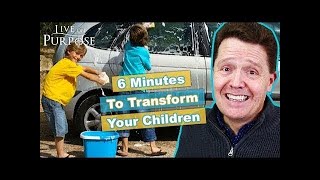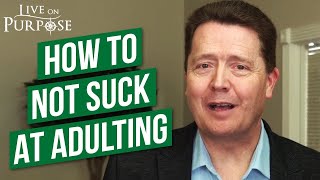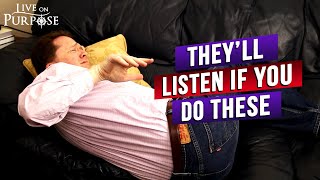Hi! Dr. Paul here again. I've got some tips for you today about how to motivate lazy young adults. I am going to assume you are a parent or an employer trying to motivate a young adult on your team. What can you do?
Step number 1, lose the lazy. I mean the label of lazy. It's a name and it's derogatory. It offends people. And it's probably not entirely accurate. They may not be motivated to do what you want them to do but they are certainly motivated to do what they want to do. So, they may not even be lazy. What we name things matters.
I learned this from Ron Zeller –world-class leadership coach who was talking to me about naming and the power that it has over our own psyche and behavior. Ron shared a story with me that illustrates this concept really nicely. He was talking about Adam and Eve from the Bible. They were the first people on earth and Adam had a job – name all of the animals. So, here comes a horse and Adam looks at the horse and he observes it and he interacts with it a little bit. He names it jumping creature. I don't know. I guess Ron was there. He was kind of old at the time. So, maybe he knew jumping creature. Now, why is that significant? I still didn't know. Until Ron pointed out Adam did not name the horse lunch. See the difference? Jumping creature or lunch. What's the difference in how you would interact with either of those creatures? Do you see? The name that you pick determines how you treat whatever it is that you've named.
I was sitting next to a fella in this particular seminar that Ron was teaching. I heard him starting to sniffle a little bit. I'm like, “Dude, you okay?” He's dabbing his eyes with a hanky and says, “I've named my son rebellious. That doesn't even sound like a name.” That is what he had named his son and it changed how he was interacting with and showing up for his son. The names that we pick matter. That's why we're starting there. Lose the lazy. Delete the label. It's not helping. It's not serving you. It's not serving the young adults that you're working with. I know it's in the title of the video. That's because that's what people are searching for. That's part of the problem. So, let's lose the label.
I want to establish the next parameter. Communication before consequences. Don't get me wrong, consequences are important. We are going to use appropriate consequences and I will get back to that in just a minute. Communication is more important than the consequences. This assumes that someone is mature enough to have a reasonable rational conversation with you. There are exceptions and I talk about this in other articles. I will put a link in below to a video called teaching children responsibility where I go over three stages of moral development. Review that video if you want to see what those are.
For most relationships with young adults, they are mature enough that you can have an actual conversation with them. Go there first. Talk to them before you jump in and try to implement consequences. Especially if this is your own child. With our own kids, we have a history. This is not so true of young adults that might be working on your team in a work setting. For example, we have a history of giving them consequences of disciplining them and now, when they are young adults, we want to bring all of that old history up and put it into our current relationship. That doesn't always work very well. What are we going to do with that communication before consequences? We want to transition into a consultant role. A consultant rather than a person who's giving consequences. In fact, most of the consequences that young adults are dealing with are natural consequences and all we have to do is stay out of the way and not meddle.
To be in a consultant role means that you are going to give them 3 distinct messages. These messages are number one, if it is your own child and even if it's somebody who works for you, you can find a way to do this appropriately. I love you no matter what and even if. I value you as a person. You are important. You are a great individual. That's the first message.
Message number 2 in the consultant role, if you have any questions, ask. I've been around for a while I know a few things. I'm happy to share any information I have with you. When I use this message with young adults, it almost always solicits questions. I'll tell them for example, “You know that thing that you're dealing with? I have some thoughts about that. if you ever want to hear them, let me know.” It drives them nuts. At first, they're like, “Well, you're probably going to tell me anyway.” “Oh, no. No I don't want to burden you with my thoughts or my unsolicited advice. Just let me know if you want to hear it. I'm happy to share.” That's message number 2. If you have any questions, ask.
Message number 3 in the consultant role, “Good luck.” This is an acknowledgment that you are not driving. Even if it's your own child, when they become young adults, they are driving their lives. Have you noticed? Yeah, that's why you feel frustration sometimes. You need to back off as a parent and realize that they are the ones in the driver's seat. Not you. Buckle up because you're on board for the ride. But you're not the one driving, are you? Accept that. I've consulted with parents in my office who said, “Well, what am I supposed to do? Just let them make their own decisions?” Listen to your question? What do you mean “let them?” Like it's up to you? It's not. That's why those three messages are so powerful.
Quick recap: I love you no matter what and even if. If you have any questions, ask. Good luck. Those are the three messages that put you into a consultant role. Now, let's get practical because sometimes the teen or young adult in your life sometimes needs a little motivation. Please be kind. Do this nicely. Stay in a positive place yourself as a parent. Calm voice, calm face, calm body. You need to unlock the nest a little. This idea comes from birds who do this as the young fledgling birds start to grow and they sprout their feathers and their wings are starting to gain some strength and it's time for them to launch out of the nest. Well, the nest is comfy. Mom has filled it with things like down and feathers and nice soft stuff. You know that makes this nest so comfortable. A lot of species of birds will start to pluck the fluff out of the nest and just make it a little more prickly and a little less comfortable for those baby birds. Why? Because they understand that those young ones need to have some additional motivation to actually launch and get out of the nest. Un-fluff your nest a bit. Take an honest look at what it is that you are providing for free or with no expectation of responsibility or exchange. There are probably some things that you could start plucking out to encourage and motivate that young one to get out of the nest so to speak.
Parenting? Not for the faint of heart. That's why we've got your back. We have so many resources available to you including a free parenting breakthrough call with a member of our team. Go to: drpauljenkins.com/breakthroughcall. Schedule a free complimentary call with one of our team to find out what we can do for you.
Link the video how to be good at adulting.


